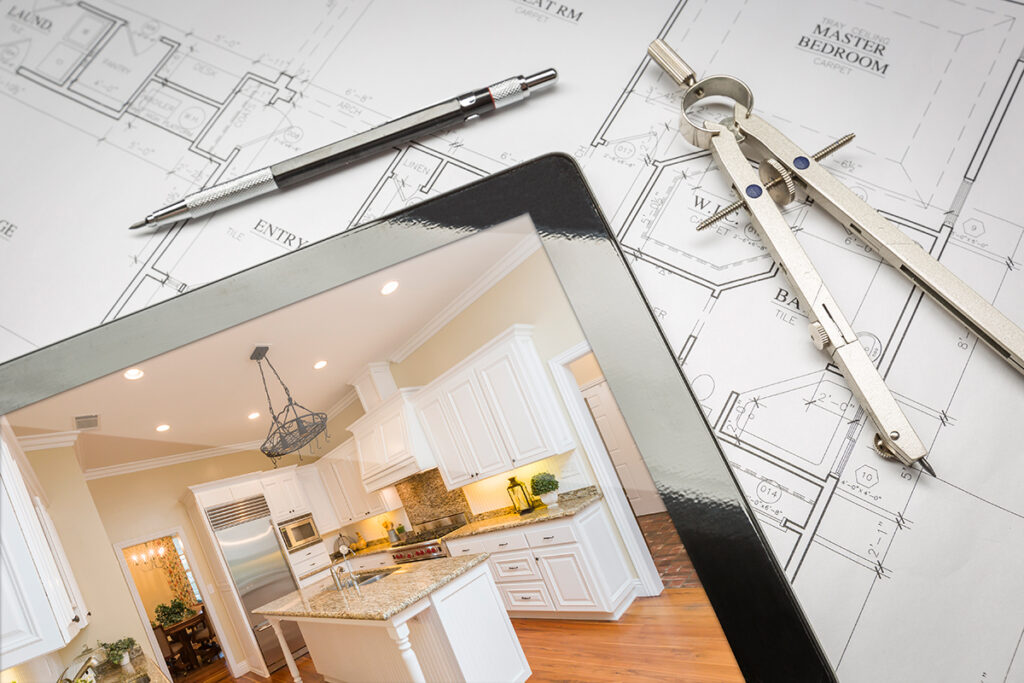Budget
There are two main areas to focus on when it comes to a budget. If you are hiring a contractor or design-build firm directly, be sure to be open and honest about budget starting with the first phone call. The budget shouldn’t be a closely guarded secret. Ideally, the budget should be included in every conversation. This will ensure all parties are on the same page and save a lot of time and frustration.

The second item pertaining to budget is if you decide to go the route of design-bid-build. This older method consists of hiring an architect or interior designer first, then obtaining quotes from contractors later. At least once a week I meet with a potential client who has a design and specifications provided by an independent architect, interior designer, or kitchen designer. This may be a project as simple as a bathroom update to a full addition and kitchen. As soon as we start discussing a budget, you can feel the air leave the room. Most of the time, the initial starting budget for the project is MUCH higher than anything discussed with the designer or architect, if a budget was discussed at all.
Whether you are working directly with a design-build firm or managing the design process yourself, make sure all parties agree on the budget range for the project before you sign the contract.
Contract and Pricing
Once you’ve established a general project concept and scope, make sure everything is included in your agreement. Read the entire agreement and all the fine print. I’m amazed by how many people hire companies and then complain about the process even though the entire process was described in detail in writing. A well-written contract, read and understood by the client will protect both the client and the designer or contractor and ensure good communication moving forward.

When it comes to the price of the work, this is where budget, contract, and actual price are a critical triumvirate. Make sure you understand the expected price range of design service and/or construction. When it comes to construction estimates verses quotes, make sure you ask your contractor whether they generally require a lot of change orders (PRICE INCREASES AFTER CONTRACT!) during the work. It’s sad to say, but there are a lot of unscrupulous companies who will deliberately underprice a job knowing that once the work starts they have you over a barrel. At that point, what choice do you have but to sign any change orders to ensure the workflow continues?
I highly recommend you check out www.mass.gov and read about Home Improvement Contractor requirements and required contract terms before you hire anyone to work on your home. Due diligence on your part will ensure you hire an experienced, qualified, and honest firm for your design or design-build needs.
Scheduling
Scheduling expectations should also be discussed with the very first phone call. Living through a construction project at your home can be very stressful, especially if children are in the mix. Careful planning is required to ensure that the work is scheduled at a time that works best for you. In some cases, you may even need to move out.
Plan any home improvement projects 6 to 12 months in advance whenever possible. This will provide ample time for project development including land surveys, code compliance research, design, specifications, and permitting.
 With all the popular TV shows about home remodeling, many homeowners don’t have a realistic expectation of how long a job will take. In addition, they may look at a project such as a bathroom remodel and not only undervalue the project, but think it will only take 2 or 3 weeks just because it is a small room. Be sure to have frank conversations with your contractor about how long project development will take, what a realistic start date range is, and how long construction will take.
With all the popular TV shows about home remodeling, many homeowners don’t have a realistic expectation of how long a job will take. In addition, they may look at a project such as a bathroom remodel and not only undervalue the project, but think it will only take 2 or 3 weeks just because it is a small room. Be sure to have frank conversations with your contractor about how long project development will take, what a realistic start date range is, and how long construction will take.
Knowing how long a project will take to develop and how long construction will take will help you reduce “construction fatigue.” This happens on almost every job where after a couple of months you just want everyone out of your home. Just remember, be fair with your contractor, especially if the job is on schedule.
Don’t micro-manage!
Whether it is during the design phase or during construction, remember that you’ve hired professionals, and let them do their jobs. We have clients who literally stay home and watch our crews work all day. Others are perpetual “glass is half empty” types, who are looking for problems and seem to enjoy confrontation. You know the type, when they are out to eat they send the plate back three times because “they know best” how to prepare that meal! Well, you can imagine how it is doing business with these folks.
It’s important to understand that no matter how great the team you are working with is, mistakes may happen. In addition, mishaps might be out of their control. Perhaps a part came in defective and workflow must stop until the replacement part arrives. Don’t take that out on the team working in your home.
Respect and appreciate that the people working in your home are doing the best job they can for you. Let them manage the workflow and solve problems on your behalf. Clients who micromanage tend to slow down the entire process from design to construction, and often cause stress for themselves and the team.
Relationship
Any smart business owner wants to partner with great clients and keep them as customers for a lifetime. The same goes for a savvy homeowner. Do you really want to vet out a new company every time you are planning a project? Think long term and remember that saving a few bucks is not nearly as important as having a working relationship with a team you can trust. Would you rather be the nightmare customer who the designer or contractor want to avoid at all costs, or the one getting a post project gift and a yearly holiday card because you’ve truly been a joy to work with?





